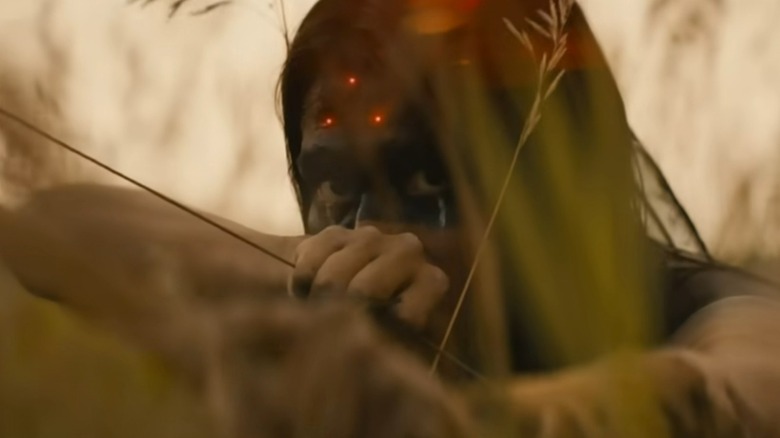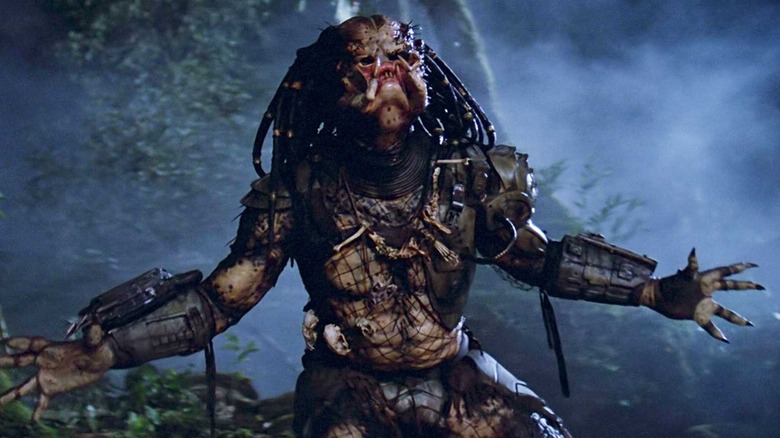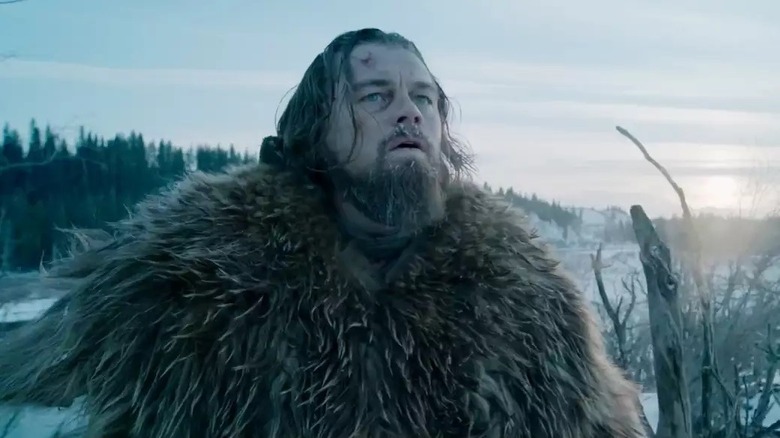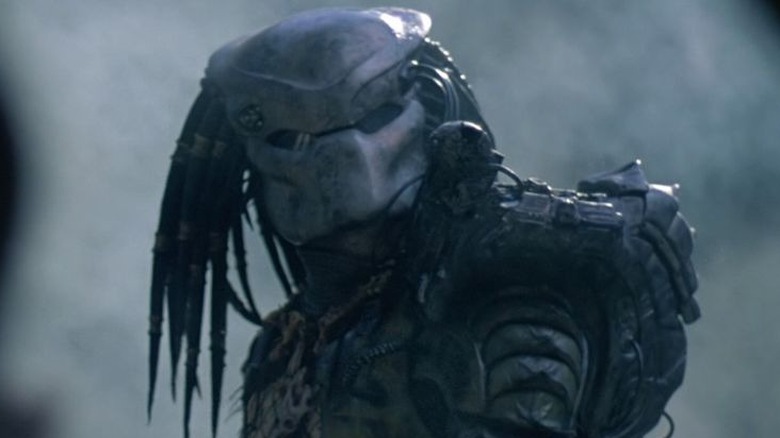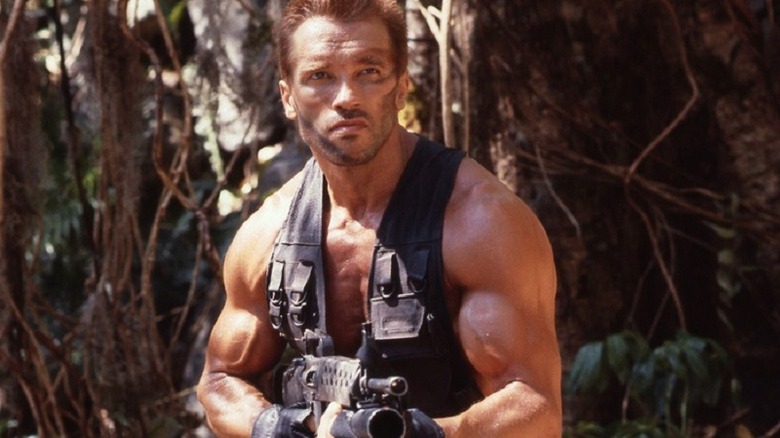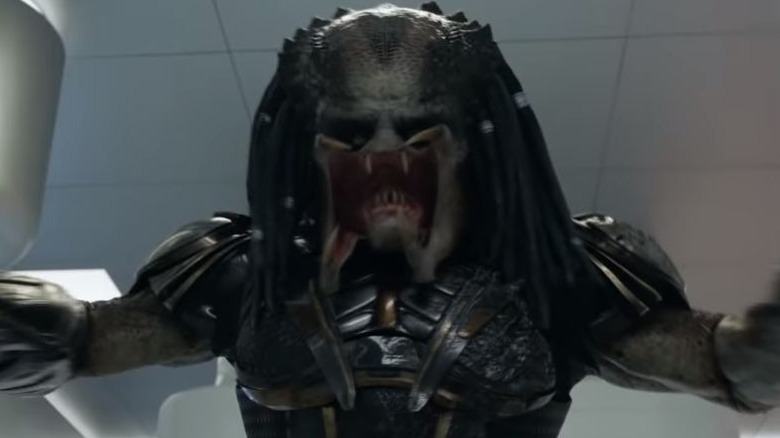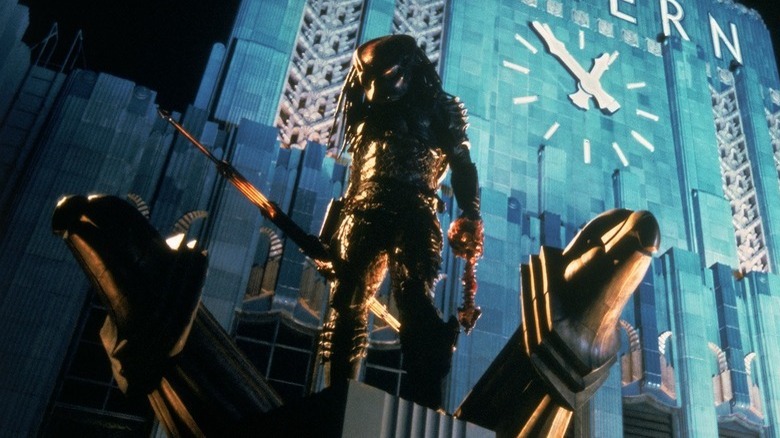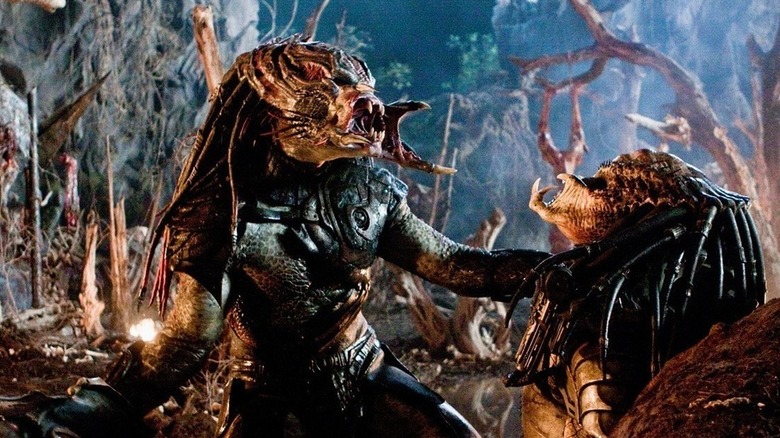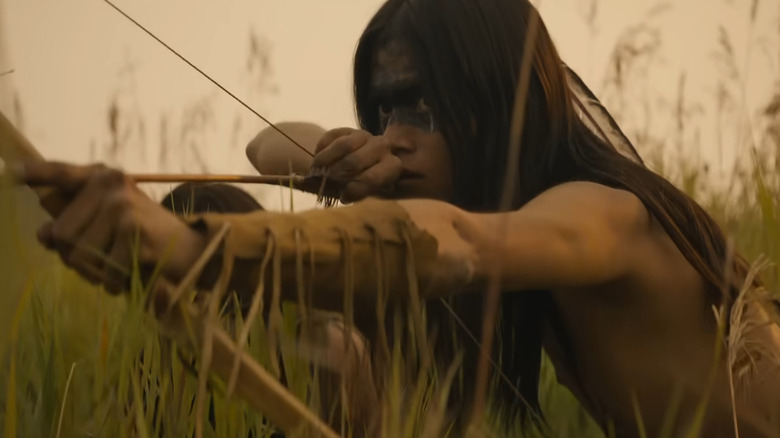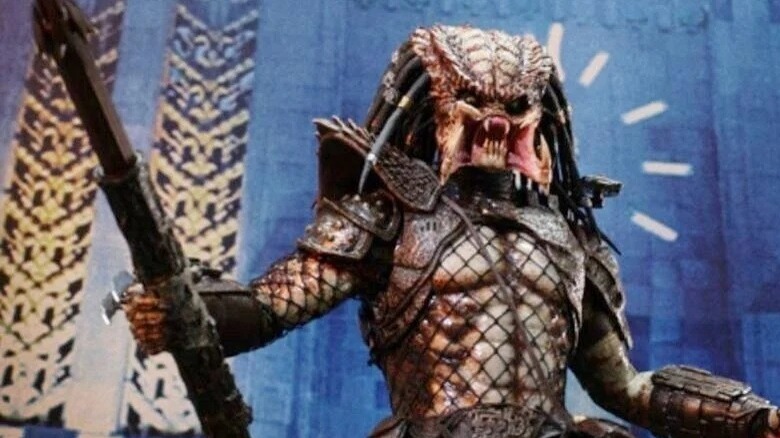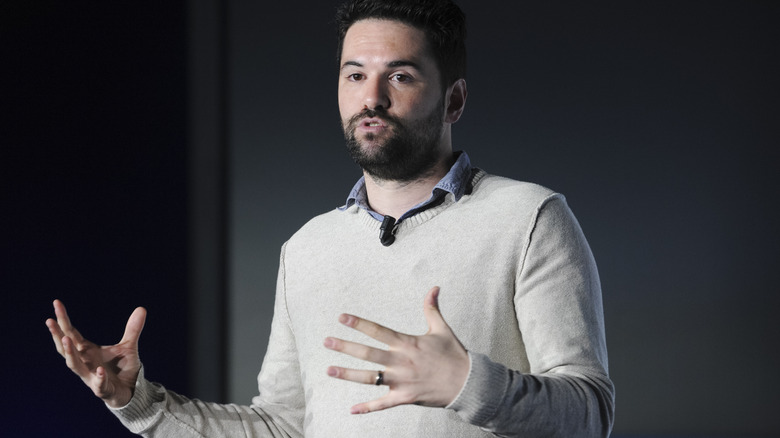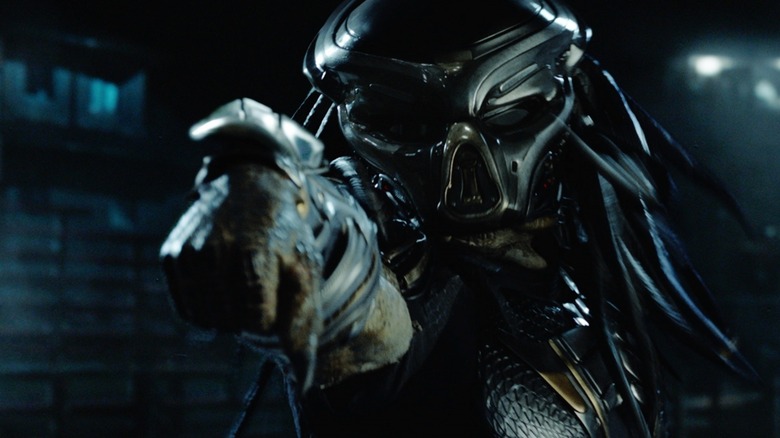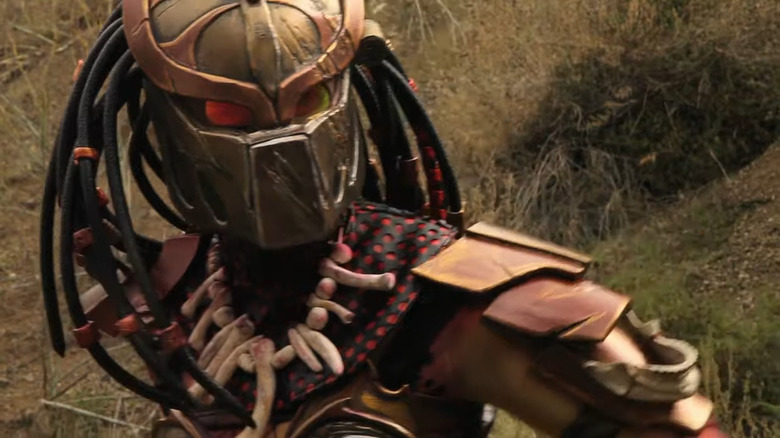The Untold Truth Of The Predator Prequel, Prey
In 1987, Arnold Schwarzenegger went toe-to-toe with his greatest nemesis of the time. No, it wasn't Sylvester Stallone, but the dreadlocked alien with a face only a mother could love: The Predator. In the moment, no one could have predicted that this action-packed sci-fi set in a jungle would spawn an entire franchise, one which would eventually cross over with those acid-spitting sweethearts known as Xenomorphs from "Alien." As time has gone on, however, the "Predator" story has continued to expand — sometimes a little confusingly — and now there's also a prequel titled "Prey."
Directed by Dan Trachtenberg from a script by Patrick Aison, "Prey" wants to answer the question: What happens when the Predator becomes the hunted? It's certainly a different and interesting take on the lore, but the jury is still out on if it's a necessary addition to the series. The making of "Prey" wasn't quite a stroll in the park, though — in fact, it was more like a walk on the wild side of filmmaking. From the secrecy around what the filming of the movie to the lawsuit that threatened to derail everything, here is the untold truth of the "Predator" prequel, "Prey."
Prey took about six years to happen
Hollywood moves at its own pace. Even though we may see announcements and believe something has been fast-tracked into development, that isn't always the case. There's a lot of work (and negotiations) that take place behind the scenes. A project can be in the making for years on end as the studio decides whether or not to pull the trigger on the production.
In the case of "Prey," that's exactly what took place. Deadline broke the news that Dan Trachtenberg was set to direct a new "Predator" film in 2020, and the filmmaker took to his Twitter account to confirm the report. Trachtenberg revealed he'd been working on the project for four years before the announcement and it wasn't supposed to have been revealed this way, citing that it would have been a surprise. One has to wonder how the team planned on unveiling it as a "Predator" film in the first place. Would they have waited until the first trailer or the actual movie here? Either way, it would have been a risky marketing move.
The movie is more Revenant than Predator
The past "Predator" films have found a way of blending action and science fiction into a tense environment. While each movie might have deviated a little further from the 1987 original's rumble in the jungle, one thing has always been certain: There will be gunfire, hunting, and a lot of blood and guts. Thanks to this tried-and-tested formula, it's more than likely that the average viewer will draw comparisons to films such as "Alien" or even "Terminator" when thinking about the alien creature's close encounters of the bloodshed kind. However, one of the former producers on the film believes "Prey" is more similar to 2015 Alejandro González Iñárritu's Oscar-winning picture than anything else.
"It actually has more akin to 'The Revenant' than it does any film in the 'Predator' canon," producer John Fox told Collider. "You'll know what I mean once you see it." If any draft of the script included a Predator fighting off a vicious bear and hiding in it, that's the version of the director's cut that we all deserve to see. Start that movement and hashtag on Twitter now.
Prey couldn't be released until a lawsuit was settled
In 1984, brothers Jim and John Thomas penned a script titled "Hunters." By 1987, this screenplay was turned into the John McTiernan-directed "Predator." After pulling in almost $100 million at the global box office (via The Numbers), it started a huge franchise that spanned across comics, toys, and video games for the next three decades. However, as per the U.S. Copyright Act, the original "Predator" writers tried to reclaim the rights to their work after 35 years and to prevent 20th Century Studios from releasing any further "Predator"-related material without negotiating new terms with them (via Reuters).
Due to the lawsuit, the studio wasn't able to release any "Predator" films until the dispute had been resolved by the court of law. This is likely also the reason that "Prey" was such a secretive project in the first place, since it would have been possible to repackage it as a different movie if an agreement wasn't reached between Fox and the Thomas brothers. The parties eventually reached a satisfactory settlement in January 2022, so it was all systems go for "Prey" thereafter.
The producers believe it captures the magic of the original film
Every "Predator" sequel has had mixed levels of success. While they have proven to be fruitful enough at the box office to merit more movies, they haven't quite been critical or fan-approved hits. In fact, since 1987's "Predator," only 2010's "Predators" has had a Fresh rating on Rotten Tomatoes and even that was just 65%. Hence, it's easy to understand the apprehension for any forthcoming films.
For producer John Davis, he is of the opinion that "Prey" encompasses and embodies everything that made the original such a well-received film. "It goes back to what made the original 'Predator' movie work," Davis told Collider. "It's the ingenuity of a human being who won't give up, who's able to observe and interpret, basically being able to beat a stronger, more powerful, well-armed force." As true as that might be, there is something important missing from "Prey" that will be desperately missed by anyone who loves the original: The chopper.
The film's original title was different
During a film's production, there are many factors that can change: Actors, directors, crew members, story threads, score, and even the title. It isn't unusual for productions to utilize working titles until a final name is settled on that everyone is happy with. For "Prey," it originally operated another moniker that was also pretty fitting for the franchise — and no, it wasn't "If It Bleeds, We Can Kill It" or "Sexual Tyrannosaurus."
As per Collider's report, the title was "Skull," which accurately describes what the Predator loves to collect as a hobby. Everyone in the industry thought that was the official name too, since most people were caught off guard when the new title was announced. That being said, there is a certain symmetry here, since "Prey" is also the opposite of "Predator." Much like the first film, however, there is a blurred distinction between the prey and predator here.
Prey was made to be R-rated
Think of a property like "Deadpool." One of the biggest reasons for its success is the fact that Wade Wilson is unrestrained and allowed to do whatever he chooses in an R-rated film. If he were to be toned down and made more family friendly, the magic of the Merc With a Mouth would wane and he'd simply be Spider-Man with a cheaper mask. "Predator" is much the same way. If this intergalactic hunter is collecting skulls and skinning its victims alive, would this gore really be possible in a PG-13 feature film?
Producer John Davis told Collider that "Prey" was always envisioned as an R-rated feature; however, it was created with the ability be cut down to a lower rating if required. (Read: If the studio told them to do so.) Fortunately, no compromises were necessary as Hulu announced that "Prey" would be rated R after all, delighting the fans across the globe who want to see the alien creature in all its violent glory.
The president of 20th Century Studios calls Prey a creatively ambitious project
As per Hulu, "Prey" will be set 300 years in the past, as a Comanche warrior named Naru battles against the alien predator in the Great Plains. It's a departure from the modern setting of other "Predator" films, making this an intriguing and promising premise that's yet to be explored in this franchise.
Steve Asbell, 20th Century Studios President, told The Hollywood Reporter it's a "bold take" and a "big creative swing" that will undoubtedly shake up the franchise's status quo. Asbell's choice of words are interesting here, since they indicate the overall riskiness of the project. Studios are extremely cautious of reinventing popular franchises or doing something that might divide the fanbase, since Film Twitter can be brutal and fans remember every single misstep. While the cause for concern is understandable when millions of dollars are involved, is the very essence of creativity not evolution and moving forward?
The filmmakers wanted an accurate portrayal of the Comanche
By setting "Prey" in the Great Plains and focusing on the Comanche Nation, the filmmakers have a responsibility to accurately portray the "Lords of the Plains" and their unique culture. Hollywood has had a reputation of appropriating cultures and butchering stories for its own money-making purposes throughout the decades; however, there has been a concerted effort to remedy this situation and to provide a historically accurate approach in newer films.
The team behind "Prey" was well aware of what was expected of them here. They released a statement (via The Wrap) that said they were "committed to creating a film that provides an accurate portrayal of the Comanche and brings a level of authenticity that rings true to its Indigenous peoples." It also helped that one of the "Prey" producers was Jhane Myers, a member of the Comanche Nation, ensuring that there was someone on the team who was able to provide feedback on if something was correct.
The former president of Fox played a huge role in fast-tracking Prey
It's no secret that the entertainment industry has been playing a game of musical chairs in recent times. With Disney acquiring Fox, there has been a lot of shuffling and reshuffling at the head offices as execs move in and out of their positions in the new structure. As a result, many planned productions have fallen down the wayside as the new regime isn't sold on them. Just ask all those canned "X-Men" movies that were in various stages of development.
"Prey" could have suffered the same fate, though it had something that a lot of other productions didn't have the luxury of: A high-powered exec in its corner. Producer John Davis credited the former president of Fox for helping to get the ball rolling on "Prey" as soon as everyone wrapped up work on Shane Black's "The Predator" in 2018.
"Emma Watts was really instrumental here," Davis told Collider. "She said, 'You know what, let's go put this into development now and let's push on this now. Let's go for this now.' We couldn't be shooting one movie and prepping another, especially when one was the current-day end of the franchise and the other was the period beginning of the franchise. So it was always done with a lot of secrecy."
The director's leap from Uncharted to Prey
In the overall time it took to create "Prey," the "Uncharted" movie went through no less than six directors. That isn't the full story, though, as the film adaptation of the popular video game franchise resided in development hell for over a decade before Ruben Fleischer took the reins and the movie was released in February 2022. At one point, "10 Cloverfield Lane" director Dan Trachtenberg was attached to helm "Uncharted," but like others before him, he waved goodbye to Nathan Drake and parachuted out of the production before the cameras started to roll.
Well, as one door closed, another opened, specifically the portal to the Predator's mothership (via DiscussingFilm). If Trachtenberg hadn't departed "Uncharted," there was a good chance that he might not have been available to make "Prey." Judging by the amount of time that he had dedicated to the film's pre-production, it's clear that he felt exceptionally passionate about this story and wanted to be the person to tell it.
Prey could have been a sequel to Shane Black's The Predator
"The Predator" wasn't the success that the studio and filmmakers might have initially imagined. While it brought in over $160 million at the box office (via Box Office Mojo), it holds the distinction of having the same critical and audience rating of 33% on Rotten Tomatoes. Despite this poor reception, there were still plans for a sequel.
Producer John Davis praised Shane Black's film to Variety in 2018, stating, "This is an auteur-driven reimagining. Shane Black has a voice and a signature, and it kind of re-enlivens the franchise." He added there were plans for two further sequels and Black was the director earmarked to make them come to life. In all likelihood, "The Predator 2" could have been the next item on the agenda, but it's possible that the muted reception towards Black's film swayed everyone to fast-track "Prey" instead.
The Predator fan film with an extremely similar premise
In 2019, filmmaker Chris R. Notarile released a Predator fan film titled "Warrior: Predator" on YouTube. As per the official synopsis, the story is as follows: "A 16th century Native American warrior is forced to fight for her life against sister Predators. Will this fierce warrior survive? Or will she become another trophy for the deadly hunters?" Hmm ... Sounds awfully familiar, doesn't it?
As soon as the trailer for "Prey" arrived online and the basic premise was revealed, Notarile posted a link to his fan film on his Facebook account and told his followers to "get your first look at 'Prey.'" He followed this up with another post, stating, "Any major studios feel like developing an original action movie about an indigenous hero, and not shunning it to a lower level streaming service like Hulu? Hit me up." Unquestionably, there are notable similarities between "Warrior: Predator" and "Prey," but was it all coincidental or intentional? Whichever way, Notarile doesn't seem pleased about it.
